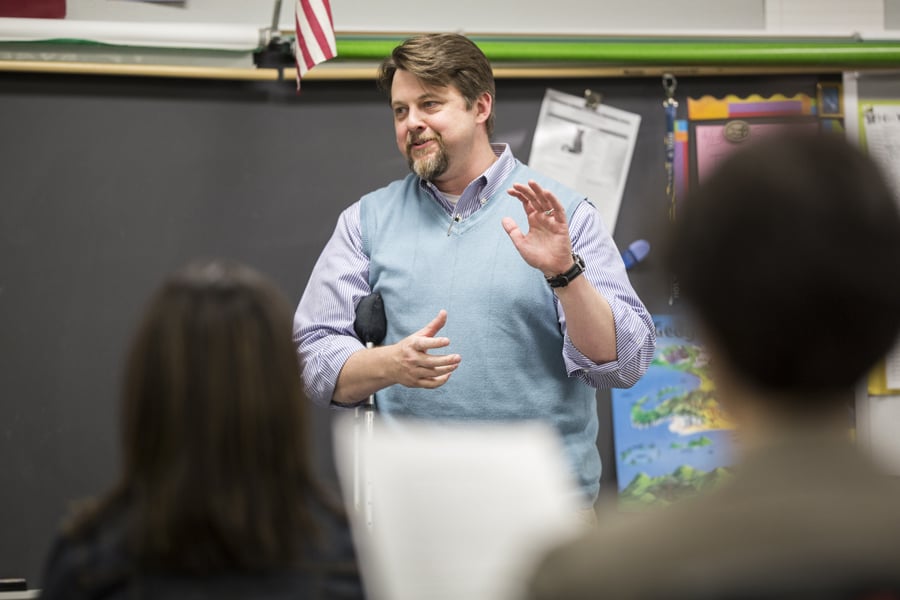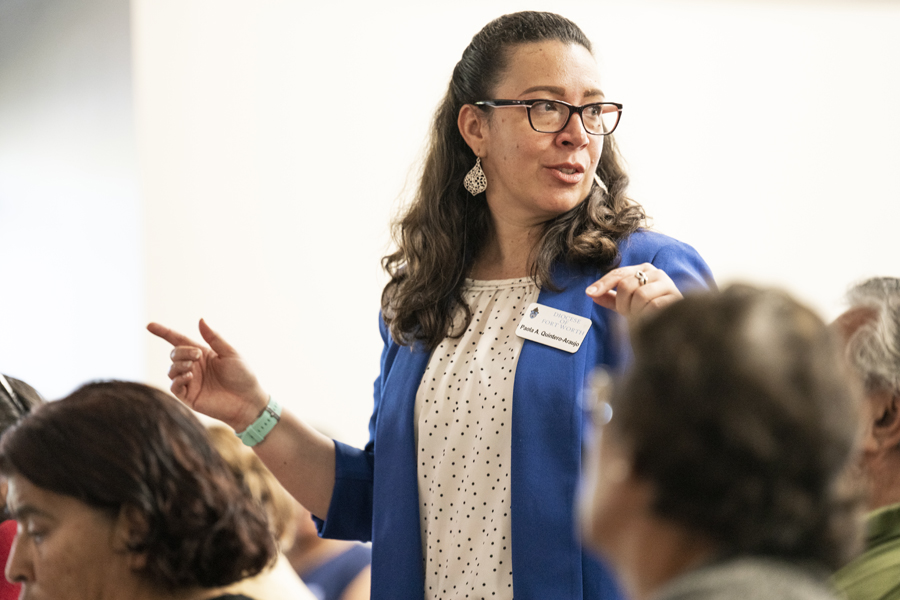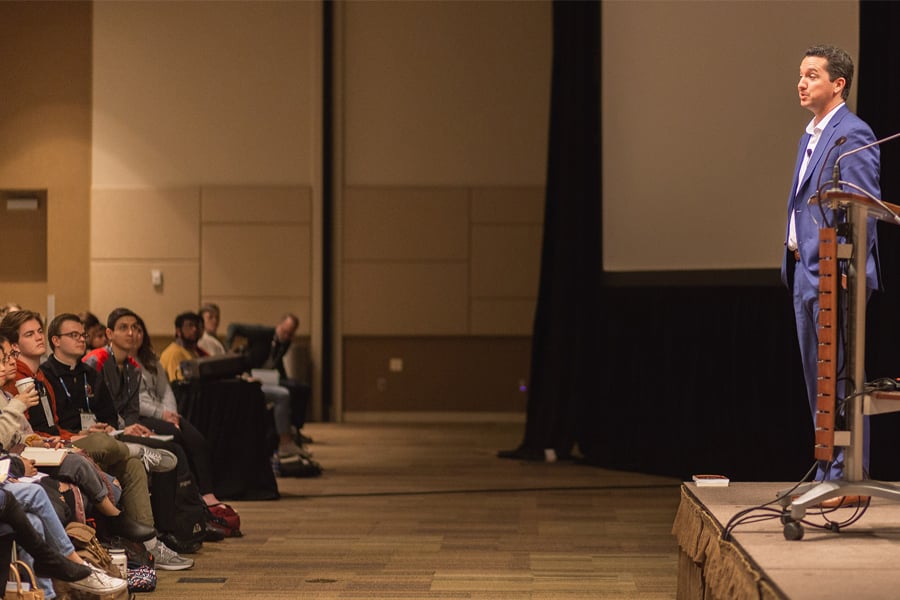Apologetics teaches the reasons for our hope, not how to win debates

Jason Whitehead, diocesan director of faith formation, leads a class through the St. Junipero Serra Institute. (NTC/Juan Guajardo)
FORT WORTH — It’s a question Jason Whitehead hears often as the Thanksgiving and Christmas holidays approach: My kids and grandkids are falling away from the faith. What can I do?
“Catholic family members may no longer attend Mass, have disassociated themselves from the Church or joined one of the Protestant mega churches, and strange ideas start being shared around the dinner table,” explained the diocesan director of faith formation and interim director of evangelization and catechesis. “Parents have to be equipped to answer the societal issues and all the things everyone has wrong regarding the Church.”
A course in apologetics, offered through the St. Junipero Serra Institute, promises to give people the information necessary to explain what the Church believes and teaches so they can engage others in meaningful, non-confrontational conversations. The six-week course in English begins Monday, September 13 from 7 to 9 p.m. at Most Blessed Sacrament Church in Arlington. Cost is $75 plus books with limited tuition assistance available. An adult formation program operated by the Diocese of Fort Worth, the Institute provides certification as well as continuing education classes. An apologetics course in Spanish is planned for a later date.
“Apologetics is often referred to as defense of the faith, and that’s true, but it’s primarily defense of the hope that is within you,” said Whitehead, the course’s instructor. “It is an entire discipline centered on answering people’s questions and clarifying their confusion.”
Offending nonbelievers with an approach that is argumentative or contentious is not part of the process.
“People can fall into the trap of thinking the purpose is to win a debate and that’s not what apologetics is at all,” he continued. “It’s an aspect of evangelization and catechesis.”
Course participants will delve into the office and nature of the papacy, the communion of saints and Mary; the sacraments; the Church and salvation; divine revelation and the Church; and Scripture and skepticism. Whitehead will also discuss secular issues impacting society such as same-sex unions, the rise of atheism and agnosticism, and the role of women in the Church.
“This course won’t address every issue in the world, but we’ll talk about the main ones that come up at the dinner table,” he added.

Paola Quintero-Araujo leads a St. Junipero Institute class in this 2019 photo. (NTC/Juan Guajardo)
Jason Evert, author of Theology of the Body in One Hour and If You Really Loved Me, believes the Catholic faith is being undermined like never before. Each year the apologist speaks to thousands of young people about the virtue of chastity and fields questions about same-sex attraction, peer pressure, dating, and abstinence.
“Young people today are facing an unprecedented array of threats to their faith including the ‘new atheism,’ pornography, gender ideology, and the redefinition of marriage,” Evert suggested. “In many cases, parents themselves will need to seek answers they never received during their own time of catechesis as young people.”
Parents are the primary evangelists to their children so learning about apologetics equips them to discuss the criticisms and negative view of the Catholic faith young people may encounter at school, with friends, or online.
“Families should see [apologetics] as an opportunity for all of them to deepen their faith,” he added.
Helping North Texas Catholics embrace the faith at a more profound level is a key element of apologetics, according to Paola Quintero-Araujo, director of the St. Junipero Serra Institute. Parish employees or volunteers seeking certification must complete three levels of formation, but adult education enrollees can take any course in any order when it’s offered.
“Apologetics is for anyone who wants to learn more about their own faith and what we believe,” Quintero-Araujo affirmed. “Very few average Catholics have a great understanding of what the Church teaches and can explain it to other people. You can’t defend what you don’t know.”
Living in the Bible Belt, Catholics often are challenged by co-workers, friends, and neighbors about what they believe, she said. Some of the most frequently asked questions are: Have you been saved? Why do you obey the pope? How can you call Mary the mother of God?
More important than defending the faith is understanding the faith.
“First and foremost, you have to be a good listener and listen to what the person is saying so you can answer based on your knowledge of the faith,” the institute’s director specified. “It’s not about arguing. It’s having an intelligent conversation about what our faith really teaches.”

Trent Horn leads a workshop titled "The Beginner's Guide to Defending Your Faith," at the FOCUS-sponsored Student Leadership Summit Dec. 31, 2019 in Phoenix. (CNS/John Caballero/Catholic Sun)
Researching Catholic beliefs for himself and debunking commonly held misconceptions brought Trent Horn into the Church as a convert when he was in high school.
“After doing that, I really had a passion for teaching others how to find the answers I found in my spiritual journey,” said the apologist who works for the San Diego-based media ministry Catholic Answers.
To share the faith and make it accessible, apologetics teaches how to speak to others in the language of today’s culture.
“We don’t water it down or compromise it but go through a process John Paul II called inculturation,” said Horn, a parishioner at St. Elizabeth Ann Seton in Keller. Inculturation encourages evangelization through cultural sensitivity.
When St. Paul preached to the Athenians, he didn’t use the Old Testament — a resource they didn’t know. Rather, he cited the more relatable Greek philosophers.
“So, we should speak to people and use examples and arguments that make sense to them,” he explained. “Give good answers and ask good questions in the spirit of charity and humility.”
The author of Made This Way and Why We’re Catholic says you don’t have to know everything to be an apologist. Eighty percent of apologetics is correcting misunderstandings about the Church.
“Learn to provide basic reasons for the faith,” Horn advised. “Apologetics is a means to help people grow closer to our Lord. We shouldn’t take our eyes off that.”
